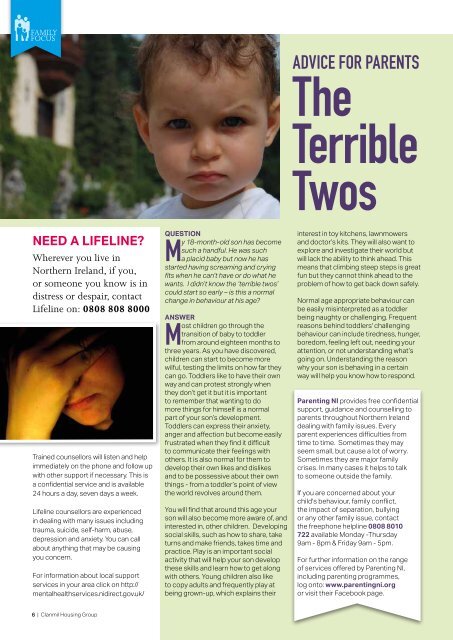Create successful ePaper yourself
Turn your PDF publications into a flip-book with our unique Google optimized e-Paper software.
FAMILY<br />
FOCUS<br />
ADVICE FOR PARENTS<br />
The<br />
Terrible<br />
Twos<br />
NEED A LIFELINE?<br />
Wherever you live in<br />
Northern Ireland, if you,<br />
or someone you know is in<br />
distress or despair, contact<br />
Lifeline on: 0808 808 8000<br />
Trained counsellors will listen and help<br />
immediately on the phone and follow up<br />
with other support if necessary. This is<br />
a confidential service and is available<br />
24 hours a day, seven days a week.<br />
Lifeline counsellors are experienced<br />
in dealing with many issues including<br />
trauma, suicide, self-harm, abuse,<br />
depression and anxiety. You can call<br />
about anything that may be causing<br />
you concern.<br />
For information about local support<br />
services in your area click on http://<br />
mentalhealthservices.nidirect.gov.uk/<br />
QUESTION<br />
My 18-month-old son has become<br />
such a handful. He was such<br />
a placid baby but now he has<br />
started having screaming and crying<br />
fits when he can’t have or do what he<br />
wants. I didn’t know the ‘terrible twos’<br />
could start so early – is this a normal<br />
change in behaviour at his age?<br />
ANSWER<br />
Most children go through the<br />
transition of baby to toddler<br />
from around eighteen months to<br />
three years. As you have discovered,<br />
children can start to become more<br />
wilful, testing the limits on how far they<br />
can go. Toddlers like to have their own<br />
way and can protest strongly when<br />
they don’t get it but it is important<br />
to remember that wanting to do<br />
more things for himself is a normal<br />
part of your son’s development.<br />
Toddlers can express their anxiety,<br />
anger and affection but become easily<br />
frustrated when they find it difficult<br />
to communicate their feelings with<br />
others. It is also normal for them to<br />
develop their own likes and dislikes<br />
and to be possessive about their own<br />
things - from a toddler’s point of view<br />
the world revolves around them.<br />
You will find that around this age your<br />
son will also become more aware of, and<br />
interested in, other children. Developing<br />
social skills, such as how to share, take<br />
turns and make friends, takes time and<br />
practice. Play is an important social<br />
activity that will help your son develop<br />
these skills and learn how to get along<br />
with others. Young children also like<br />
to copy adults and frequently play at<br />
being grown-up, which explains their<br />
interest in toy kitchens, lawnmowers<br />
and doctor’s kits. They will also want to<br />
explore and investigate their world but<br />
will lack the ability to think ahead. This<br />
means that climbing steep steps is great<br />
fun but they cannot think ahead to the<br />
problem of how to get back down safely.<br />
Normal age appropriate behaviour can<br />
be easily misinterpreted as a toddler<br />
being naughty or challenging. Frequent<br />
reasons behind toddlers' challenging<br />
behaviour can include tiredness, hunger,<br />
boredom, feeling left out, needing your<br />
attention, or not understanding what’s<br />
going on. Understanding the reason<br />
why your son is behaving in a certain<br />
way will help you know how to respond.<br />
Parenting NI provides free confidential<br />
support, guidance and counselling to<br />
parents throughout Northern Ireland<br />
dealing with family issues. Every<br />
parent experiences difficulties from<br />
time to time. Sometimes they may<br />
seem small, but cause a lot of worry.<br />
Sometimes they are major family<br />
crises. In many cases it helps to talk<br />
to someone outside the family.<br />
If you are concerned about your<br />
child's behaviour, family conflict,<br />
the impact of separation, bullying<br />
or any other family issue, contact<br />
the freephone helpline 0808 8010<br />
722 available Monday -Thursday<br />
9am - 8pm & Friday 9am - 5pm.<br />
For further information on the range<br />
of services offered by Parenting NI,<br />
including parenting programmes,<br />
log onto: www.parentingni.org<br />
or visit their Facebook page.<br />
6 | Clanmil Housing Group


